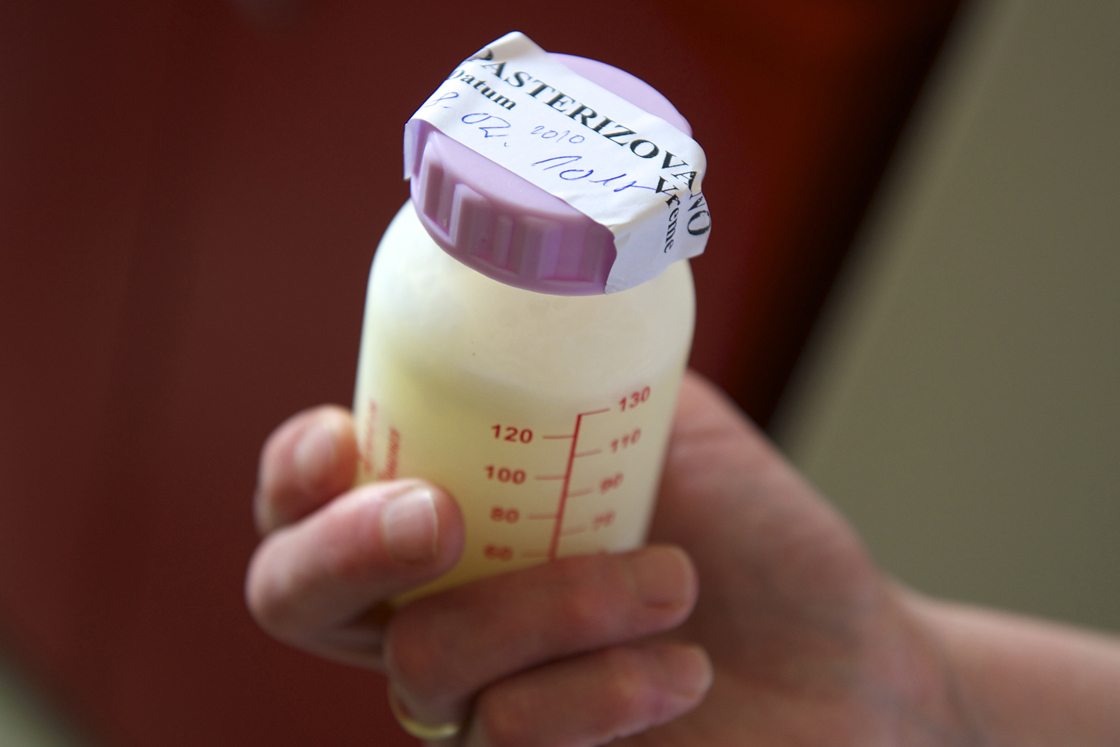As health officials warn parents about the dangers of buying human breast milk online, scientists suggest that some of the products sold over the Internet are topped off with cow’s milk.

Breast milk offers plenty of nutritional benefits for newborn babies, but some new moms can’t nurse and don’t want to rely on formula.
While the Internet could provide a solution, researchers out of Ohio’s Nationwide Children’s Hospital say that breast milk sold online is purposely “topped off” with cow’s milk or infant formula – a shortcut that could leave babies vulnerable to infectious diseases.
“We found that one in every 10 samples of breast milk purchased over the Internet had significant amount of cow’s milk added and this poses a risk to infants with an allergy or intolerance to cow’s milk. If a baby with cow’s milk allergies were to drink this milk, it could be very harmful,” said Dr. Sarah Kelm, the study’s lead researcher.
Kelm’s team has been studying breast milk for the past few years: its previous research found that 21 per cent of parents buying human milk online were doing so for their babies with pre-existing medical conditions. Sixteen per cent of parents were looking for human milk because their babies were intolerant to infant formula.
READ MORE: Breast milk sharing programs gaining speed, despite warnings
Breast milk swaps, which pair moms in need of breast milk with their peers who have excess milk, and online sites to buy breast milk have been under plenty of scrutiny. Officials say there’s no way of knowing if moms take certain medications, how hygienic the conditions are in collecting the milk and if the milk is kept in proper temperatures, Health Canada told Global News in 2013.

Get weekly health news
Kelm’s research found that bacterial or viral contamination was in more than 75 per cent of milk samples purchased online. That research led to a 2010 warning from the U.S. Food and Drug Administration.
This time around, the scientists purchased and tested 102 samples of breast milk bought on milk-sharing websites. The samples were stacked next to their own preparations of human milk diluted with just enough cow’s milk to test positive for bovine DNA.
All the samples tested positive for human milk, but 11 also contained cow’s milk – 10 of which were more than minor or accidental levels, the researchers note. They’re urging new moms to talk to their family doctors before turning to the Internet to purchase breast milk to feed their babies.
“We were concerned that, because money is being exchanged in these transactions, there might be an incentive to boost milk volumes in order to make more money. Cow’s milk and infant formula resemble human milk and could potentially be added to boost volumes without the recipient knowing,” Kelm said.
READ MORE: Why healthy men are drinking breast milk
“Mothers who consider purchasing breast milk over the Internet should beware – when you obtain milk from an unfamiliar source, you cannot know for sure that what you are getting is safe for your baby,” she warned.
Her findings, published Monday in the journal Pediatrics, follow on the heels of British research released in March that called the online sale of breast milk “dangerous.”
Watch above: As Heather Yourex reports, sharing unprocessed breast milk can be dangerous.
Scientists out of Queen Mary University London said that breast milk sold online is cheaper than what’s sold out of regulated milk banks. But that’s because sellers cut corners by skimping on pasteurization, testing for disease and contamination and properly collecting, storing and shipping the milk.
Then there are the warnings from public health officials about these milk sharing programs with Health Canada even stepping in with caution.
“Health Canada has some concerns regarding the sharing of that kind of milk because it’s difficult to discern the source,” Helene Couture told Global News last year. Couture works at the federal agency’s bureau of microbial hazards.
“If somebody has AIDS or HIV these kinds of disease could be transmitted by breast milk. This product should not be shared freely without some kind of verification that the product is safe for the baby,” Couture said.
READ MORE: Got breast milk? Doctors say milk bank would save babies’ lives
Studies have found breast milk is the best option when feeding newborn babies because it offers numerous benefits — from improved development to healthy growth patterns, and lower rates of infection.
There are 350,000 children born in Canada each year and the physicians group estimates that seven per cent of these births are premature.
About 95 per cent of mothers pump breast milk, but only 50 per cent produce enough to feed their babies.
Read Kelm’s full findings here.
carmen.chai@globalnews.ca
Follow @Carmen_Chai








Comments